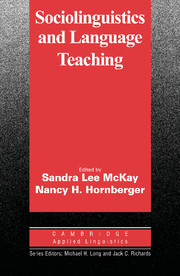Book contents
- Frontmatter
- Contents
- List of contributors
- Series editors' preface
- Preface
- Acknowledgements
- Part I LANGUAGE AND SOCIETY
- 1 Language attitudes, motivation, and standards
- 2 Societal multilingualism
- 3 World Englishes
- 4 Language planning and policy
- Part II LANGUAGE AND VARIATION
- Part III LANGUAGE AND INTERACTION
- Part IV LANGUAGE AND CULTURE
- CONCLUSION
- Index
4 - Language planning and policy
Published online by Cambridge University Press: 22 July 2009
- Frontmatter
- Contents
- List of contributors
- Series editors' preface
- Preface
- Acknowledgements
- Part I LANGUAGE AND SOCIETY
- 1 Language attitudes, motivation, and standards
- 2 Societal multilingualism
- 3 World Englishes
- 4 Language planning and policy
- Part II LANGUAGE AND VARIATION
- Part III LANGUAGE AND INTERACTION
- Part IV LANGUAGE AND CULTURE
- CONCLUSION
- Index
Summary
Introduction
This chapter provides a brief introduction to the fields of language planning and language policy. It is divided into five major sections: The introduction addresses basic issues and assumptions which underlie and influence the direction of the study of language planning and policy. The second section discusses key definitions, describes various levels and types of language planning, and identifies those who are officially and unofficially involved in it. The third part contrasts influential scholarly orientations and approaches toward language planning and policy analysis and briefly reviews the work of several authorities in terms of their approaches. The next section describes and analyzes major goals for language planning, that is, language goals, political goals, and economic goals. The fifth section focuses on language in education planning and deals with two important legal challenges to established policies and practices. It also revisits a contentious debate over appropriate instruction for language minorities and considers issues of professional responsibility for linguists and language teachers. Next, it examines the impact of negative institutional language policies and practices and provides examples of positive steps that educators can take in promoting education for language minorities. In the discussion of issues, an attempt is made to maintain a critical stance toward controversial matters in order to avoid glossing over some of the underlying conflicts and tensions within the field. A brief conclusion completes the chapter.
Language planning is relatively young as a field of formal academic study, dating roughly from the 1960s.
Information
- Type
- Chapter
- Information
- Sociolinguistics and Language Teaching , pp. 103 - 148Publisher: Cambridge University PressPrint publication year: 1995
Accessibility standard: Unknown
Why this information is here
This section outlines the accessibility features of this content - including support for screen readers, full keyboard navigation and high-contrast display options. This may not be relevant for you.Accessibility Information
- 5
- Cited by
